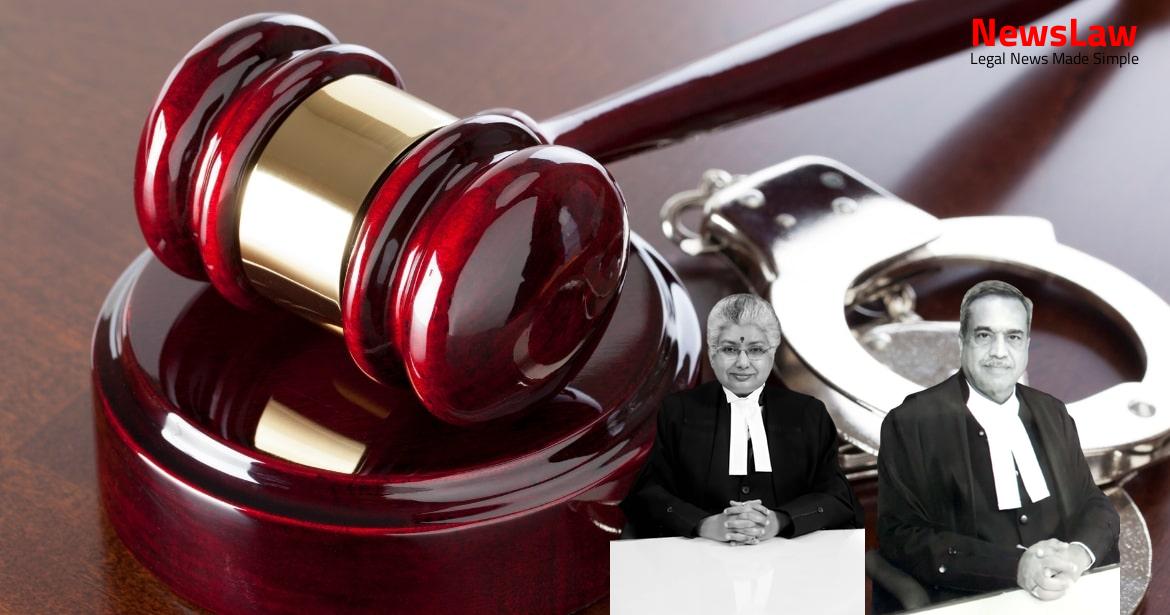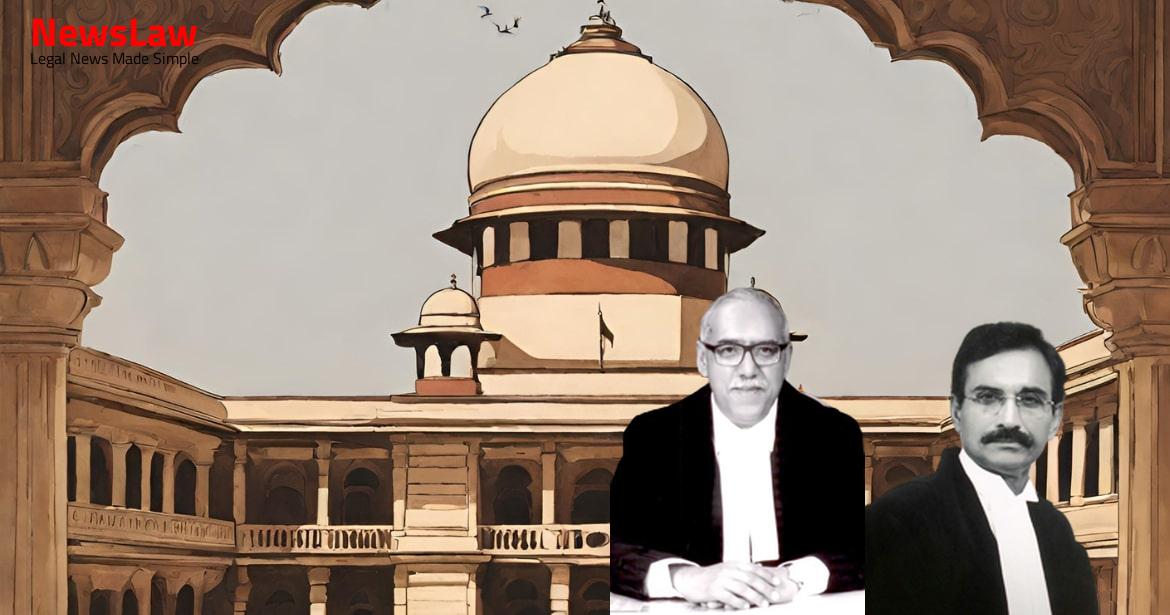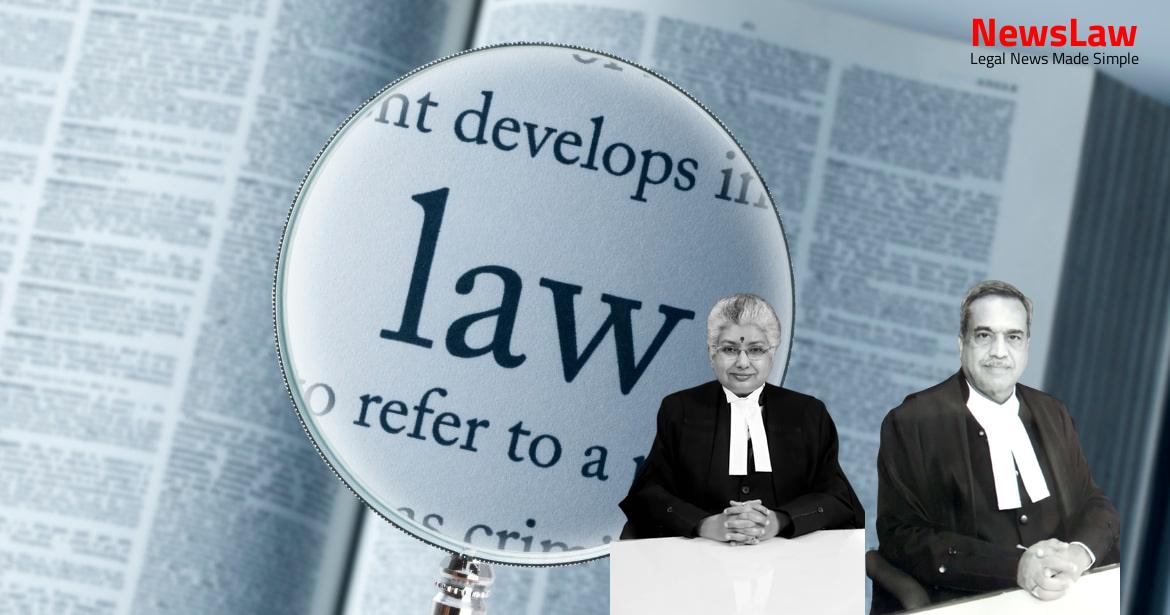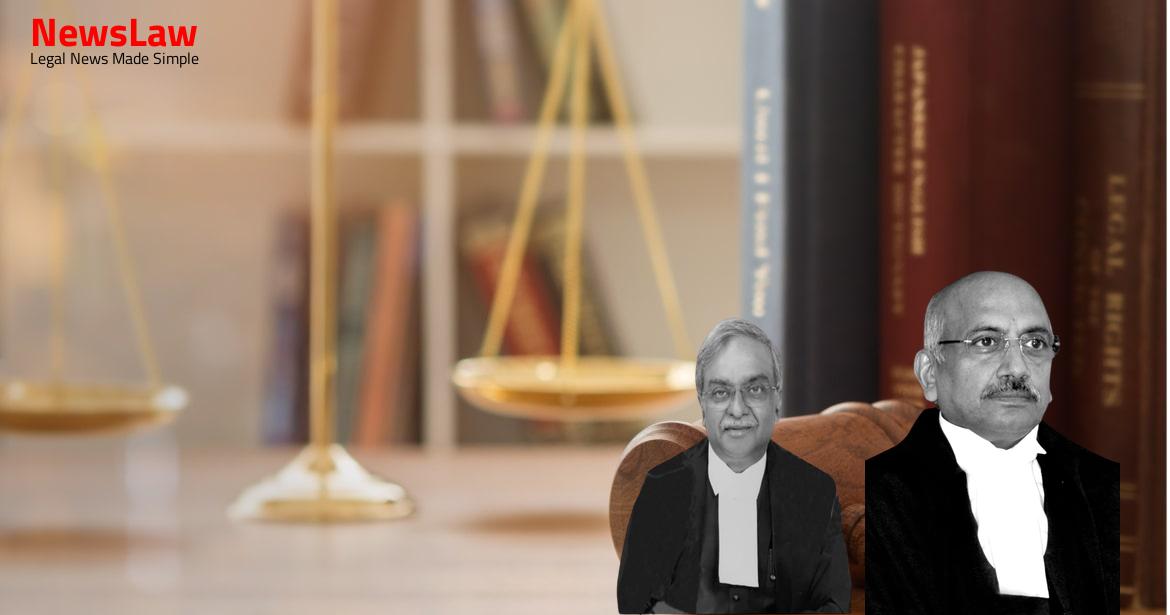In a recent legal case, the court’s detailed analysis of a public auction sale decision sheds light on the intricacies of judicial review in matters concerning public property. The court’s scrutiny of the auction process, challenges raised by non-participants, and the obligation of the State Government towards temple properties highlights the importance of upholding the integrity of auction procedures. Let’s delve deeper into the nuances of this case and understand the implications of the court’s legal analysis on future auction sales.
Facts
- The High Court granted interim stay of all further proceedings in Writ Petition No 41 of 1999, subject to furnishing a bank guarantee of Rs.30 lakhs within two weeks.
- The appellant, who purchased the property in 1998, filed appeals against the High Court’s decision in Writ Appeal Nos.790 and 1069 of 2018, directing re-auction of the properties at a higher upset price.
- The Commissioner, Endowments Department, unilaterally cancelled the auction held on 24.06.1998, leading to a revision filed by the appellant under Section 93 of Act of 1987.
- The High Court observed that the revision became infructuous as the Commissioner had revoked the order, and Government intervention was not needed unless a suo moto revision was taken up.
- Multiple writ petitions and orders were passed, culminating in the High Court directing re-auction of the land with a higher upset price due to the increased value over the years.
- The Division Bench also noted that the appellant had agreed to pay Rs.30 lakhs, supported by a bank guarantee, ensuring the Temple received more than the set amount.
- The High Court allowed the appellant and the writ petitioner to participate in the re-auction, provided they meet the eligibility criteria.
- Shri L. Kantha Rao filed Writ Petition No 41 of 1999 to stop the execution of the sale deed for the auctioned land.
- Appellant became the highest bidder at Rs.13,01,000/- per acre but only wanted to buy 1200 square yards.
- The Temple Trust filed Writ Appeal No.790 of 2018 challenging the judgment of 02.02.2018.
- Sale deed executed in favor of the appellant on 31.12.1998 by Temple’s Executive Officer.
- Auction for the land held on 22.05.1998 in the presence of Deputy Commissioner, Endowments.
- Physical possession of the land was given to the appellant.
- Office of the Commissioner, Endowments confirmed the sale in favor of the appellant on 22.12.1998.
- Appellant deposited the balance amount of Rs.15,69,810/- on 30.12.1998.
- Appellant filed a revision under Section 93 of the Endowments Act against the cancellation of the auction.
- Represented on 20.07.1998 that the land could fetch more money.
- The second round of litigation began with Shri L. Kantha Rao’s actions.
- Executive Officer of the Temple filed for an Income Tax Clearance Certificate on 01.01.1999.
- Shri L. Kantha Rao did not participate in the auction or deposit the Earnest Money Deposit (EMD) of Rs.20,000/-.
- Auction took place on 24.06.1998 with 45 participants including the appellant.
- The first round of litigation was initiated by Shri Jagat Kumar who did not participate in the auction.
- Wife of Shri L. Kantha Rao filed Writ Appeal No 1069 of 2018.
- Notification to sell the land published in the Andhra Pradesh Gazette on 22.05.1997.
- Highest bid by the appellant was Rs.13,01,000/- per acre.
- Appellant paid Rs.7,85,000/- immediately as per tender conditions.
- Commissioner of Endowments granted permission to sell the land on 13.11.1997.
- Shri L. Kantha Rao passed away on 01.03.2018.
- Sale deed presented for registration on 01.01.1999.
- Order of 26.11.1999 allowed Shri L. Kantha Rao’s revision, quashing the previous order.
- Appellant then filed Writ Petition No 25407 of 1999 challenging the order of 26.11.1999.
- Auction cancelled on 24.07.1998 based on a representation by Shri Jagat Kumar.
- Third round of litigation began with the auction where appellant bid Rs.5,55,000/- per acre.
- Interested participants had to deposit Rs.20,000/- as Earnest Money Deposit for the auction on 24.06.1998.
Also Read: Ruling on Circumstantial Evidence in Murder Case
Arguments
- The wife of the deceased petitioner was not entitled to file an appeal as she was not an heir of the petitioner who filed the petition as a Public Interest Litigation.
- The court’s duty is to ensure that the price fetched in a public auction is adequate, especially in the case of a Public Trust.
- Challenges to the auction sale by parties who did not participate in the auction, especially after a significant period of time, should not be entertained unless fraud is alleged and proven.
- The highest bidder in a public auction should not be unfairly targeted or have the sale set aside based on objections raised by non-participants.
- The Division Bench of the High Court erred in setting aside the auction sale after a prolonged period without clear evidence of illegality or fraud.
- The appellant had paid the full sale consideration and was in possession of the property, making the retrospective interference unjust.
- The State Government is obligated to act in the best interest of the temples and maximize revenue from auctions of temple properties.
- The Temple Trust’s objections raised after the auction and execution of the sale deed lack merit and suggest ulterior motives.
- The Division Bench’s decision to order re-auction based on belated offers by non-participants undermines the integrity of the initial auction process.
- The auction was conducted publicly with multiple bidders, and subsequent challenges by non-participants should not be given credence.
- Learned counsel for respondent relied on previous court decisions
- Counsel highlighted the importance of securing the best price in auction of public property
- Counsel prayed for the dismissal of the appeals based on the above arguments
Also Read: Challenging Legal Presumptions in Negotiable Instrument Cases
Analysis
- The Division Bench of the High Court has ordered re-auction of the land in question without setting aside the previous auction/sale in favor of the appellant.
- The appellant had complied with the contractual obligations and completed the sale deed, therefore, the second respondent had no jurisdiction to cancel the sale.
- The auction conducted in 1998 had 45 participants, and the highest bid offered by the appellant was found to be fair at that time.
- The subsequent objections raised by Shri Jagat Kumar and Shri L. Kantha Rao, who did not participate in the auction, were not based on valid grounds.
- The Division Bench of the High Court ordered re-auction without sufficient evidence to prove that the property valuation in 1998 was undervalued.
- The re-auction ordered after 23 years was deemed unfair to the appellant, who was the original successful bidder.
- The Division Bench should have considered the lack of bona fides on the part of objectors like Shri Jagat Kumar and Shri L. Kantha Rao.
- The re-auction decision allowed participation of original writ petitioner’s heirs, despite lack of locus standi and merit in their objections.
- The sale deed executed in favor of the appellant was valid, and subsequent attempts to challenge it lacked merit.
- The value of the property at the time of the auction in 1998 was not disproven to be less than the highest bid offered by the appellant.
- The Division Bench did not provide sufficient reasoning to support the re-auction order, especially considering the time gap of 23 years since the original auction.
- Courts must encourage genuine PIL and discourage PIL filed for extraneous considerations.
- Courts should verify the credentials of the petitioner before entertaining a PIL.
- Courts should be satisfied about the correctness of the contents of the petition before entertaining a PIL.
- Courts should ensure substantial public interest is involved before entertaining the petition.
- Courts should ensure PIL aims at redressal of genuine public harm or injury.
- Applicants for writ of certiorari fall into ‘person aggrieved,’ ‘stranger,’ or ‘busybody’ categories.
- High Court should reject applications of ‘busybodies’ at the threshold.
- Strict ascertainment of petitioner’s standing is necessary for invoking extraordinary jurisdiction under Article 226.
- Sale in public auction can be set aside based on fraud, collusion, irregularity, or inadequate consideration.
- Setting aside public auction sale based on frivolous offers from non-participants would affect sanctity of public auction.
- Valuation as on the date of auction is the relevant consideration
- Value after many years and over two decades after the auction is not relevant
- The valuation at the time of the auction and confirmation of sale is what matters
Also Read: Legal Analysis Critique in High Court’s Quashing Order
Decision
- The auction/sale has been confirmed in the appellant’s favor.
- The registration of the sale deed in the appellant’s name and taking possession of the land is pending.
- Any pending applications have been disposed of.
- No costs have been awarded in this case.
- The present appeals have been allowed to the mentioned extent.
- The impugned judgment by the Division Bench of the High Court is quashed and set aside.
- The judgment of the learned Single Judge in Writ Petition No.25407 of 1999 is restored.
- The appellant agreed to deposit the balance amount of Rs.6,45,190/- and further pay Rs. 15 lakhs to the respondent Temple Trust/Devasthanam within two weeks.
Case Title: K. KUMARA GUPTA Vs. SRI MARKENDAYA AND SRI OMKARESWARA SWAMY TEMPLE (2022 INSC 207)
Case Number: C.A. No.-000791-000792 / 2022



